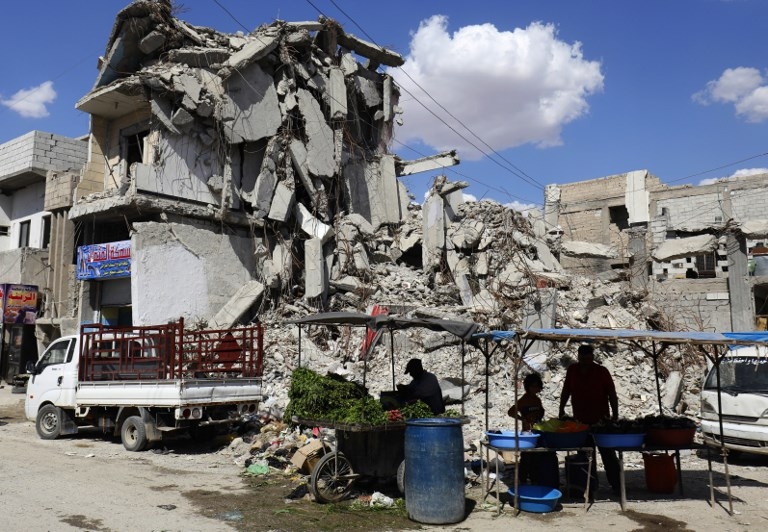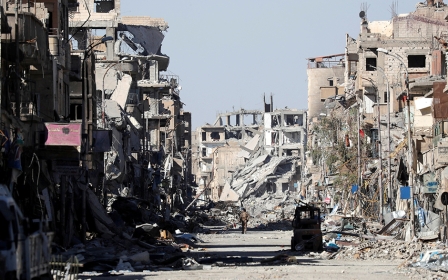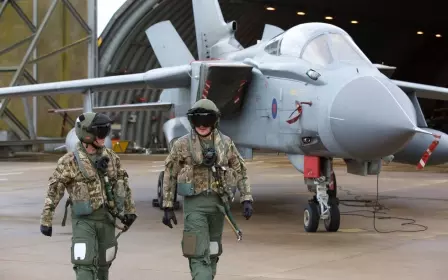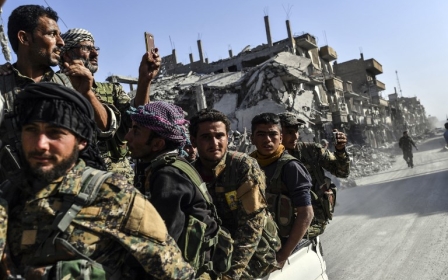SDF forces impose curfew in Syria’s Raqqa, citing instability, Islamic State attacks

Security forces in Syria's Raqqa announced a two-day curfew starting on Sunday, citing social instability and fears of Islamic State (IS) group attacks in the militants’ former stronghold.
But they also used the curfew to act against a rival rebel group in the northern city, according to the targeted faction and a war monitor.
IS was kicked out of its de facto Syrian capital last October by the US-backed Syrian Democratic Forces (SDF), an alliance of Kurdish and Arab fighters, which then set up police units to secure the city.
On Sunday, the Raqqa Internal Security Forces said they had received "information that terrorist groups working on behalf of [IS]... have entered Raqqa city to carry out attacks against stability and security".
It therefore decided to put in place "a state of emergency and a curfew in Raqqa city starting at 5am (0200 GMT) on Sunday June 24, 2018, until 5am on Tuesday".
A monitoring group, the Syrian Observatory for Human Rights, said 5,000 SDF fighters had been deployed in Raqqa and parts of the surrounding province in a major security operation.
Witnesses said internal security forces affiliated with the SDF had set up checkpoints across the devastated city, Reuters reported.
Two residents said in recent weeks the city has seen growing tensions between the majority Arab residents and SDF forces dominated by Kurdish personnel that spilled into sporadic protests last month. The protests, quelled by force, called for the SDF’s eviction from the city.
They said many of its 100,000 residents are angered by a policy of obligatory military conscription of youths and resentful of perceived discriminatory practices against the majority Arab population by senior Kurdish officials who effectively run the city.
IS lost Raqqa after four months of ferocious fighting and bombing by the SDF and the US-led coalition that left the city in ruins.
The SDF has since whittled down IS territory elsewhere in Syria's north and east to just a handful of isolated pockets, but security incidents around Raqqa itself have increased in recent weeks.
On 22 June, IS claimed its first attack in Raqqa province since being ousted, announcing through a propaganda media channel that it had detonated a roadside bomb northeast of the city.
An SDF fighter was also killed on 15 June at a checkpoint north of Raqqa, in what the Britain-based Syrian Observatory said was an IS attack.
And earlier this month, five police officers linked to the SDF were killed in a roadside blast during a routine patrol in Raqqa city.
The militant group did not claim responsibility for either incident.
Tensions have also been high in the city amid the protests that have called for the Syrian government to return to Raqqa.
On Sunday, the SDF said in a statement that the curfew was put in place because of rising instability, including "terrorist operations" and the protests.
The curfew was accompanied by early morning raids that "targeted terrorist cells and groups aimed at rocking the city's security and stability," it said.
"A number of terrorists were arrested and large amounts of weapons and ammunitions were seized, as well as documents confirming the responsibility of multiple factions in the explosions and terrorist operations that targeted Raqqa in the recent period," it added.
Among those targeted was the Raqqa Revolutionaries Brigade, an Arab faction whose fighters are from the city and who previously fought alongside the Kurdish-dominated SDF.
The Brigade posted a statement on its Facebook page on Sunday saying its headquarters in Raqqa had been surrounded by the SDF.
The SDF on Sunday arrested more than 90 members of the Brigade, the Observatory said.
Observatory chief Rami Abdel Rahman said the curfew had been imposed because of "tensions" between the SDF and the Brigade, "more than the IS attacks".
Middle East Eye propose une couverture et une analyse indépendantes et incomparables du Moyen-Orient, de l’Afrique du Nord et d’autres régions du monde. Pour en savoir plus sur la reprise de ce contenu et les frais qui s’appliquent, veuillez remplir ce formulaire [en anglais]. Pour en savoir plus sur MEE, cliquez ici [en anglais].




